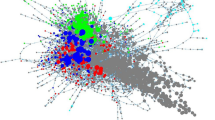Abstract
There have been two Japanese Nobel laureates in chemistry, three in physics, and one in the category of medicine or physiology. This relatively small number has been attributed to shortcomings in Japanese science. The award of the Physics Prize in 1949 to Hideki Yukawa and to his colleague Sin'itirô Tomonaga in 1965 gave public evidence of how Japanese could make outstanding individual contributions to science. Paradoxically, the Prize also reinforced a belief that such men formed part of a traditional hierarchical system. This essay examines how the Nobel Prize has been represented in Japan.
Similar content being viewed by others
Author information
Authors and Affiliations
Rights and permissions
About this article
Cite this article
Low, M. From Einstein to Shirakawa: the Nobel Prize in Japan. Minerva 39, 445–460 (2001). https://doi.org/10.1023/A:1012740020275
Issue Date:
DOI: https://doi.org/10.1023/A:1012740020275




